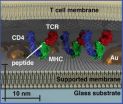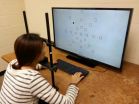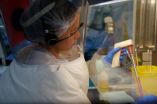Neurotics don't just avoid action: They dislike it
2014-04-22
(Press-News.org) PHILADELPHIA (April 22, 2014) – That person we all seem to know who we say is neurotic and unable to take action? Turns out he or she isn't unable to act but simply doesn't want to.
A study of nearly 4,000 college students in 19 countries has uncovered new details about why neurotic people may avoid making decisions and moving forward with life. Turns out that when they are asked if action is positive, favorable, good, they just don't like it as much as non-neurotics. Therefore persuasive communications and other interventions may be useful if they simply alter neurotics' attitudes toward inaction.
These findings come the study "Neuroticism and Attitudes Toward Action in 19 Countries." It is published in the Journal of Personality and was written by Molly E. Ireland, Texas Tech University; Justin Hepler, University of Illinois at Urbana-Champaign; Hong Li, Battelle Center for Analytics and Public Health; and Dolores Albarracín –the principal investigator of the study-- from the Annenberg School for Communication, University of Pennsylvania.
"You're so neurotic!" It's a phrase that's tossed about casually, but what exactly is neuroticism? It is a personality trait defined by the experience of chronic negative affect – including sadness, anxiety, irritability, and self-consciousness – that is easily triggered and difficult to control. Neurotic people tend to avoid acting when confronted with major and minor life stressors, leading to negative life consequences.
The researchers sought to determine whether and under what conditions neuroticism is associated with favorable or unfavorable representations of action and inaction. They investigated whether depression and anxiety would decrease proactive behavior among neurotic individuals, and whether a person's collectivistic tendencies – considering the social consequences of one's behavior before acting – would moderate the negative associations between neuroticism and action/inaction. The study found neurotics look at action less favorably and inaction more favorably than emotionally stable people do.
"People who are less emotionally stable have less positive attitudes towards action and more positive attitudes toward inaction," the authors wrote. "Furthermore, anxiety was primarily responsible for neurotic individuals' less positive attitudes toward action. The link between neuroticism and less positive attitudes toward action was strongest among individuals who endorsed more collectivistic than individualistic beliefs." So, your neurotic friend who explicitly dislikes action is probably collectivistic –favoring social harmony, family and friends.
"People who are interested in reducing the harmful consequences of neuroticism in their own lives should think about how their attitudes toward action might be affecting their behavior. By learning to value action, they may be able to change many of the negative behaviors associated with neuroticism and anxiety – such as freezing when they should act, or withdrawing from stress instead of dealing proactively with it," the authors concluded, suggesting that attitudes about action and inaction goals have broad consequences for behavior across diverse contexts and cultures. "These findings lay the groundwork for finding new methods of studying and ultimately preventing the negative consequence of neurotic action avoidance. Specifically, increasing exposure to action may be sufficient to combat tendencies to avoid proactive behavior."
This is a continuation of a study on attitudes. A study published last year of population in the same countries looked at action-inaction balance in cultural values.
INFORMATION: END
ELSE PRESS RELEASES FROM THIS DATE:
More than two-thirds of Americans support mandated coverage of birth control in health plans
2014-04-22
ANN ARBOR, Mich. — Nearly 7 in 10 Americans support mandated coverage of birth control medications, according to a new national survey by researchers at the University of Michigan Health System.
Women, blacks, Hispanics, parents with children under the age of 18 at home, and adults with private or public insurance were significantly more likely than other adults to support universal coverage of birth control medications, according to the findings that appear in the Journal of the American Medical Association (JAMA).
Individuals from all 50 states and the District of ...
First size-based chromatography technique for the study of livi
2014-04-22
Using nanodot technology, Berkeley Lab researchers have demonstrated the first size-based form of chromatography that can be used to study the membranes of living cells. This unique physical approach to probing cellular membrane structures can reveal information critical to whether a cell lives or dies, remains normal or turns cancerous, that can't be obtained through conventional microscopy.
"We've developed membrane-embedded nanodot array platforms that provide a physical means to both probe and manipulate membrane assemblies, including signaling clusters, while they ...
Scientists alter fat metabolism in animals to prevent most common type of heart disease
2014-04-22
Working with mice and rabbits, Johns Hopkins scientists have found a way to block abnormal cholesterol production, transport and breakdown, successfully preventing the development of atherosclerosis, the main cause of heart attacks and strokes and the number-one cause of death among humans. The condition develops when fat builds inside blood vessels over time and renders them stiff, narrowed and hardened, greatly reducing their ability to feed oxygen-rich blood to the heart muscle and the brain.
In a series of experiments, described April 7 in the journal Circulation, ...
Routine blood glucose measurements can accurately estimate hemoglobin A1c in diabetes
2014-04-22
New Rochelle, NY, April 22, 2014—Hemoglobin A1c is the standard measurement for assessing glycemic control over time in people with diabetes. Blood levels of A1c are typically measured every few months in a laboratory, but now researchers have developed a data-based model that accurately estimates A1c using self-monitored blood glucose (SMBG) readings, as described in Diabetes Technology & Therapeutics (DTT), a peer-reviewed journal from Mary Ann Liebert, Inc., publishers. The article is available free on the DTT website at http://www.liebertpub.com/dtt.
In "Accuracy ...
Study: People pay more attention to the upper half of field of vision
2014-04-22
A new study from North Carolina State University and the University of Toronto finds that people pay more attention to the upper half of their field of vision – a finding which could have ramifications for traffic signs to software interface design.
"Specifically, we tested people's ability to quickly identify a target amidst visual clutter," says Dr. Jing Feng, an assistant professor of psychology at NC State and lead author of a paper on the work. "Basically, we wanted to see where people concentrate their attention at first glance."
Researchers had participants fix ...
Inserm and the Institut Pasteur identify a new variant of Ebola virus in Guinea
2014-04-22
This news release is available in French.
Performed in less than a month, sequencing of the complete genome and subsequent phylogenetic analysis show that the virus present in Guinea forms a clade (variant) that is distinct from strains previously identified in the Democratic Republic of Congo and in Gabon. Epidemiological investigations also linked the laboratory confirmed cases with the initial deaths recorded during the December 2013 outbreak.
Ebola virus is a lethal, highly contagious virus for which there is presently no treatment. The symptoms are somewhat ...
How the body fights against viruses
2014-04-22
This news release is available in German. Scientists of the Max F. Perutz Laboratories of the University of Vienna and the Medical University of Vienna, together with colleagues of the ETH Zurich, have now shown how double stranded RNA, such as viral genetic information, is prevented from entering the nucleus of a cell. During the immune response against viral infection, the protein ADAR1 moves from the cell nucleus into the surrounding cytoplasm. There it modifies viral RNA to inhibit reproduction of the virus. But how is the human genome protected from inadvertent ...
What gave us the advantage over extinct types of humans?
2014-04-22
Jerusalem, April 22, 2014 -- In parallel with modern man (Homo sapiens), there were other, extinct types of humans with whom we lived side by side, such as Neanderthals and the recently discovered Denisovans of Siberia. Yet only Homo sapiens survived. What was it in our genetic makeup that gave us the advantage?
The truth is that little is known about our unique genetic makeup as distinguished from our archaic cousins, and how it contributed to the fact that we are the only species among them
to survive. Even less is known about our unique epigenetic makeup, but it ...
Turoctocog alfa in patients with hemophilia A: Added benefit not proven
2014-04-22
Turoctocog alfa (trade name: NovoEight) has been approved since November 2013 for the prevention and treatment of bleeding in patients with haemophilia A. In an early benefit assessment pursuant to the "Act on the Reform of the Market for Medicinal Products" (AMNOG), the German Institute for Quality and Efficiency in Health Care (IQWiG) examined whether this new active ingredient offers an added benefit over the appropriate comparator therapy.
According to the findings, an added benefit of turoctocog alfa is not proven. As no relevant study is available for comparison ...
Life stressors trigger neurological disorders, researchers find
2014-04-22
Washington, DC -- When mothers are exposed to trauma, illness, alcohol or other drug abuse, these stressors may activate a single molecular trigger in brain cells that can go awry and activate conditions such as schizophrenia, post-traumatic stress disorder and some forms of autism.
Until now, it has been unclear how much these stressors have impacted the cells of a developing brain. Past studies have shown that when an expectant mother exposes herself to alcohol or drug abuse or she experiences some trauma or illness, her baby may later develop a psychiatric disorder, ...






